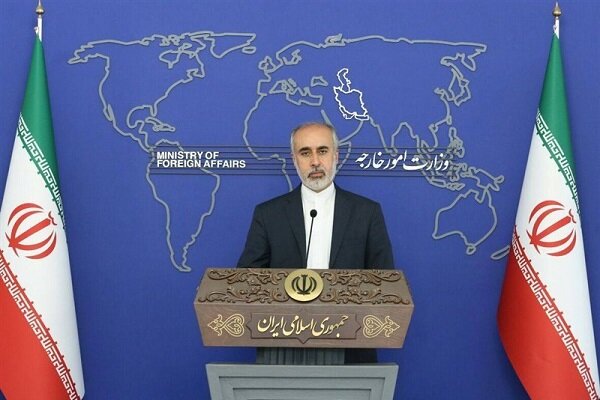If the 2015 nuclear deal is finalised, Iranian crude could “save a market that’s about to lose even more Russian barrels,” experts say.
The United States has failed to provide a response to the European Union’s proposal regarding the revival of the landmark 2015 nuclear deal, Iran’s foreign ministry spokesperson said on Monday.
At his weekly press conference, Nasser Kanaani spoke to the media and advised against discussing details or the ongoing next round of the Vienna talks as they have not yet occurred.
“The nuclear negotiations are awaiting an American response, and there is procrastination. We want a strong, good and sustainable agreement,” Kanaani said.
“So far there has been good relative progress, but there will be no agreement unless everything is agreed upon,” he added.
“America bears responsibility for the current situation and must deal responsibly and make its decision so that we can move to a new stage of negotiations,” Kanaani noted.
The potential restoration of the nuclear accord could see the release of billions of dollars in frozen Iranian funds as well as oil exports in return for Iran’s reduction of nuclear programme activities.
Iran delivered last week its response in writing to the EU on the latter’s latest draft in “due time based on its constructive and accountable approach,” Kanaani noted.
In its response, Tehran called on Washington to exercise more flexibility.
Pointing out Washington’s lack of response to the EU’s “final text”, Kanaani said talks should bear fruit once the European side announces it received a response from the US.
The EU had said its proposal was the “final text” of a possible agreement when it delivered it, essentially announcing a pause to negotiations.
On Sunday, US President Joe Biden, British Prime Minister Boris Johnson, French President Emmanuel Macron, and German Chancellor Olaf Scholz discussed the 2015 nuclear deal, formally known as the Joint Comprehensive Plan of Action (JCPOA), during a call meeting, the White House.
“They discussed ongoing negotiations over Iran’s nuclear program, the need to strengthen support for partners in the Middle East region, and joint efforts to deter and constrain Iran’s destabilising regional activities,” the report detailed.
The EU and US last week said they were “studying Iran’s response,” reports said.
The EU proposal, according to people familiar with the matter at hand, allegedly stipulates the lifting of sanctions against 150 economic institutions and 17 Iranian banks the day after a new agreement is signed, reports revealed.
It also says Tehran will “immediately begin to reverse the steps it took to advance its nuclear technology, which is now beyond the scope of what the United Nations nuclear watchdog, the International Atomic Energy Agency, and the deal’s original signatories say is acceptable,” the report added.
Washington unilaterally abandoned the JCPOA in May 2018 under the Trump administration’s “maximum pressure” campaign on Tehran. In turn, the US restored crippling sanctions, prompting Tehran to abandon restrictions on its nuclear programme about a year later.
Iran’s stockpile of enriched uranium now stands at 60% enrichment, which reports said is “its highest ever and a jump from the 3.67% limit set out by the JCPOA.”
Iran will also be able to export 50 million barrels of oil per day within 120 days of the deal’s signing. The sources, who spoke on the condition of anonymity, added that the agreement also calls for the release of $7 billion in Iranian cash that are currently being held in South Korea.
Should the US withdraw from the nuclear accord once more, it will also be required to pay a fine, the text states, according to the anonymous sources.
This has been a sticking point for the Iranian side as it continues to demand assurances be put in place to ensure it receives compensation should any future US administration abandon the JCPOA.
“The main issue facing the revival of the deal is the guarantees requested from the Iranian side ensuring Iran will be compensated in case future US administrations decide to withdraw again from the deal and while no real solution has been put forth,” a regional diplomat told CNN last week.
Sources familiar with the proposed agreement informed Al Jazeera Arabic that the new arrangement will be carried out over the course of four phases spread over two 60-day intervals.
Reportedly, Tehran officially dropped a key “red line” condition that had been a major sticking point in efforts to revive the JCPOA, a senior administration official told CNN over the weekend.
In its response last week, the Islamic Republic “did not demand” that its paramilitary arm, Islamic Revolutionary Guard Corps (IRGC) be removed from the infamous State Department’s list of Foreign Terrorist Organisations, the official told CNN.
“The current version of the text, and what they are demanding, drops it,” the official said, adding that Washington had constantly rejected such a demand.
“So if we are closer to a deal, that’s why,” the official said, as reported by CNN.
Tehran has always maintained the position that any agreement to revive the JCPOA should result in the entire removal of the sanctions in a verifiable order.







